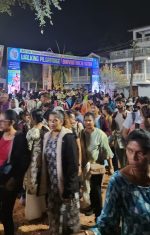By Tola Mbakwe
Guwahati, March 26, 2020: In Guwahati, the commercial capital of Assam state in northeastern India, Sister Rose Hauniang Paite has adapted her tailoring school in response to the looming threat of coronavirus over surrounding slums.
The school is normally run as a community development initiative, offering skills training to local women and children who are vulnerable to exploitation such as human trafficking. But now it’s been turned into a mask-making center.
Twenty-five women are stitching around 500 masks a day to be distributed throughout the slums of the region, where people live very close together without access to drainage systems, running water or a fraction of the money needed for medical and sanitary supplies.”
Sister Rose, as she is popularly known, hopes to help domestic workers who suffer profound hardship and exploitation.
“We are limited. If we could, we would reach out to the whole population. But for now we are reaching out to the most vulnerable. Because of the lockdown, domestic workers will have no work,” said the general councilor for social work of the Missionary Sisters of Mary Help of Christians.
“No work means no money, and no money means no food or sanitation for them and the large families that they support. Many cannot read or write and do not have access to smartphones or any information about the virus.”
Anti-slavery charity Arise Foundation, which works with Sister Rose, said the aim is to make 50,000 masks.
Tove van Lennep from the organization told Premier Christian News: “Their aim… is to get them to twelve different cities in the region.
“And although the masks are not necessarily fool proof when people don’t have access to sanitation and running water, we feel that the principle will really benefit in sort of nudging behavioral change and spreading awareness around the pandemic.
“The sisters say that they hope the initiative will sensitize people to the realities of the pandemic and encourage the communities to be a bit more attentive to hygiene and social distancing wherever possible.”
 In five days, the number of confirmed cases of Covid-19, the disease caused by the coronavirus, has jumped from about 200 to 519 on March 25, and experts say the real toll is likely to be much higher because of insufficient testing.
In five days, the number of confirmed cases of Covid-19, the disease caused by the coronavirus, has jumped from about 200 to 519 on March 25, and experts say the real toll is likely to be much higher because of insufficient testing.
In response to the recent government-imposed lockdown, the sisters will rely on their access to neighboring slums and their strong relationships with local authorities to continue to make these vital deliveries.
Van Lennep said it’s important the developed world remembers poorer nations dealing with the pandemic.
“If things are difficult for us in more wealthy and developed countries, things are a lot tougher for them. All of the already existing issues in poorer countries are being exacerbated. People are incredibly afraid for their livelihoods and, frankly, their survival and the future of their countries.”
The Indian media often report cases of trafficking of young people from northeastern India. Incidents of racial attacks on people from the region are reported from other parts of India, including New Delhi, the national capital.
With the help of people like Sister Rose, the Church in northeastern India has brought the matters to the attention of labor commission as well Catholic Bishops’ Conference of India (CBCI) Office for Labor.
Source: premierchristian.news









